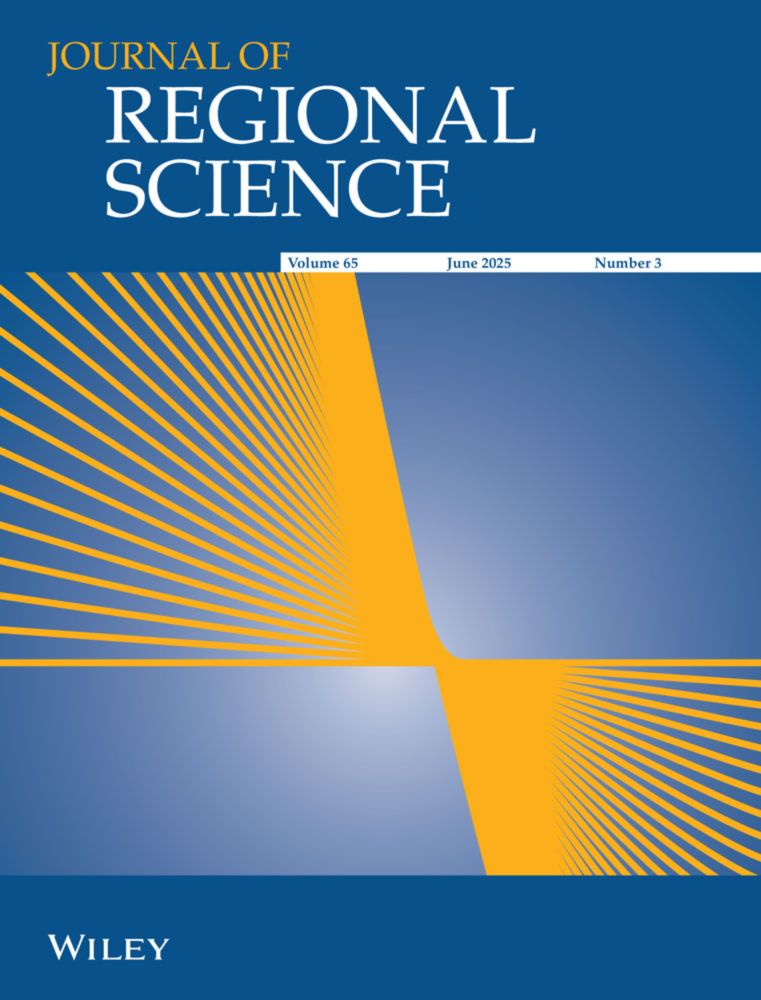American Economic Association: JOE Listings - August 1, 2025 - January 31, 2026
Come work with me at UHERO!
We're looking for someone with a background in macro/regional/forecasting to join our forecasting team www.aeaweb.org/joe/listing...., and someone with a background in tax www.aeaweb.org/joe/listing.....
05.08.2025 22:44 — 👍 0 🔁 0 💬 0 📌 0
Counterintuitive but makes sense: wfh doesn’t encourage a “work from anywhere” world, rather it reinforces large cities bc long commute times become less of a disutility
04.08.2025 08:25 — 👍 37 🔁 8 💬 4 📌 0

Work-From-Home, Relocation, and Shadow Effects: Evidence from Sweden - The Productivity Institute
A Working Paper exploring new and significant economic geography features of the work-from-home revolution.
Steven Bond-Smith | 🇳🇿 🇦🇺 HI 🤙🏻
In fact, isolated places may lose out. They can’t offer the same benefits to hybrid work as big, well-connected cities. We found this in Sweden: People in WFH-compatible jobs move closer to the big cities
productivity.ac.uk/research/wor... @productivity.bsky.social 10/
01.08.2025 19:29 — 👍 1 🔁 2 💬 2 📌 0
That means WFH probably reinforces the dominance of large cities.
Not decentralization. Not a “work from anywhere” world. 9/
01.08.2025 19:29 — 👍 0 🔁 0 💬 1 📌 0
If you’re in a small town, WFH doesn’t help much—you’re already close.
But maybe you now take a job in a bigger city.
If you’re in a big city, you might move to the edge and save on rent.
Either way: gains are bigger in big cities. 8/
01.08.2025 19:29 — 👍 0 🔁 0 💬 1 📌 0
So, unlike what many people think, working from home doesn’t make small towns more attractive.
It makes big cities more attractive.
(Or at least, their metro areas.) 7/
01.08.2025 19:29 — 👍 1 🔁 0 💬 1 📌 0
When we let remote work vary by location, the donut effect gets stronger in larger cities.
Bigger cities = bigger traffic/time costs = more benefit from working from home. 6/
01.08.2025 19:29 — 👍 0 🔁 0 💬 1 📌 0
But then people start moving to take advantage of this flexibility.
Further away = cheaper rent + fewer commutes. That’s the donut effect.
This is well known. But… 5/
01.08.2025 19:29 — 👍 0 🔁 0 💬 1 📌 0
often they commute.
People further from work… commute less. People closer in… commute more. Makes sense. 4/
01.08.2025 19:29 — 👍 0 🔁 0 💬 1 📌 0
You’d probably consider jobs a bit further away than today.
Even if the occasional commute is annoying, remote work (and perhaps a bigger salary) makes it worth it.
That’s the starting point for our model. 3/
01.08.2025 19:29 — 👍 0 🔁 0 💬 1 📌 0
If you live far away or traffic is awful, you probably avoid commuting as much as possible.
If you live nearby, working from home doesn’t change much.
Now ask:
Where would you take a job if it only required the occasional commute? 2/
01.08.2025 19:29 — 👍 0 🔁 0 💬 1 📌 0
Reviews of Economic Literature has been launched
True open access, managed by academics for academics, it follows our mass resignation from JES where the commercial publisher imposed very problematic conditions.
Submit your literature reviews in economics!
rel.journals.sup.org/index.php/re...
23.04.2025 10:01 — 👍 37 🔁 17 💬 1 📌 0
A nonpartisan research and policy institute that advances federal and state policies to help build a nation where everyone has the resources they need to thrive and share in the nation’s prosperity.
Professional economist, amateur bassoonist, and 23x half-marathon runner.
Non-profit research & grantmaking organization dedicated to advancing evidence-backed ideas & policies that promote strong, stable & broad-based economic growth
equitablegrowth.org
ESRC-funded research organisation bringing together world-leading experts from a range of disciplines and backgrounds. Headquarters at Alliance Manchester Business School.
data tinkerer with #rstats
occasional economist
Aotearoa NZ
📉 🔬, 🏳️🌈, & 🇪🇺; usual disclaimers.
PhD student @ HumboldtUni in Berlin, microeconomic theory, information economics & (digital) competition policy.
Interested in how the rich stay rich and the poor poor. Sociologist at @sriucl.bsky.social @ucl.ac.uk. He/him/his. http://perengzell.com Photo bomber @simoneschneider.bsky.social
International multi-disciplinary journal publishing spatial dimensions of contemporary socio-economic-political change
Economic Geographer @unigreifswald.bsky.social
👉 https://geo.uni-greifswald.de/lehrstuehle/geographie/wirtschafts-und-sozialgeographie/max-roessler-msc/
Economist at King's College London.
https://danielegirardi.github.io/
Political scientist & data viz creator passionate about simplifying complex ideas for leaders & policymakers. I study place-based policy, labor markets, & workforce development.
Portfolio: https://kathleenbolter.com
Ex NY Times, now author of Substack Paul Krugman. Nobel laureate and, according to Donald Trump, "Deranged BUM"
The W.E. Upjohn Institute for Employment Research is a nonpartisan, independent research organization, founded in 1945 to study policy-related employment issues and to implement workforce solutions. Based in Kalamazoo, Michigan. https://www.upjohn.org/
Economist researching cities, transport, housing, & energy. I focus on New Zealand & Australia, with European dalliances. And some chaff.
Prof. of Economic Geography and Fellow of Pembroke College, University of Cambridge. My work is on labour markets, migration, planning, and regional policy. I also love photography and baking, and have a crazy cocker spaniel called Fonzie.
Population Geographer | Spatial Demographer.
Partial to words like orthogonal + heterodox.
Also very partial to shoes.
rachelfranklin.org + rachelfranklin.substack.com
Professor of Political Economy and Eleftherios Venizelos Chair of Contemporary Greek Studies at the European Institute, London School of Economics. Director, Hellenic Observatory Centre. Labour markets, regional/national growth, industrial policy and more.
Guarda le stelle: sono tutti soli
Cyclist, sewist and embroiderer, very bad knitter, great at lunching (and “dinnering”), enthusiastically early retired, independent consultant and former CEO of the Regional Studies Association :-)
A hillwalking economist working on panel time series with a love for coding econometric methods.
Assistant Professor at University of Bolzano.
Co-Editor Spatial Economic Analysis
www.jan.ditzen.net
Stata projects: https://github.com/JanDitzen

